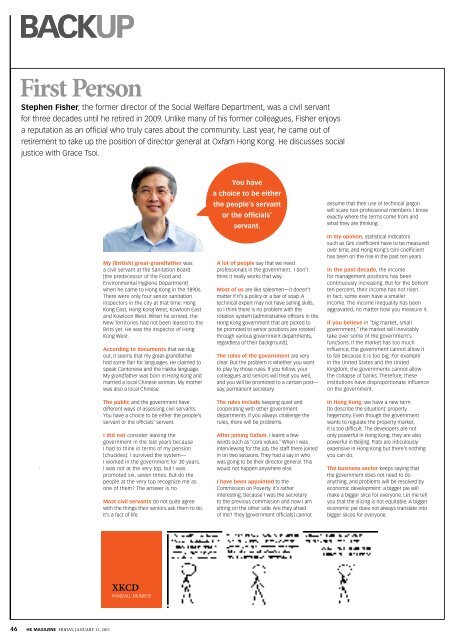HKMagazine_974
HKMagazine_974
HKMagazine_974
You also want an ePaper? Increase the reach of your titles
YUMPU automatically turns print PDFs into web optimized ePapers that Google loves.
BACKUP<br />
First Person<br />
Stephen Fisher, the former director of the Social Welfare Department, was a civil servant<br />
for three decades until he retired in 2009. Unlike many of his former colleagues, Fisher enjoys<br />
a reputation as an official who truly cares about the community. Last year, he came out of<br />
retirement to take up the position of director general at Oxfam Hong Kong. He discusses social<br />
justice with Grace Tsoi.<br />
46 HK MAGAZINE FRIDAY, JANUARY 11, 2013<br />
My [British] great-grandfather was<br />
a civil servant at the Sanitation Board<br />
[the predecessor of the Food and<br />
Environmental Hygiene Department]<br />
when he came to Hong Kong in the 1890s.<br />
There were only four senior sanitation<br />
inspectors in the city at that time: Hong<br />
Kong East, Hong Kong West, Kowloon East<br />
and Kowloon West. When he arrived, the<br />
New Territories had not been leased to the<br />
Brits yet. He was the inspector of Hong<br />
Kong West.<br />
According to documents that we dug<br />
out, it seems that my great-grandfather<br />
had some flair for languages. He claimed to<br />
speak Cantonese and the Hakka language.<br />
My grandfather was born in Hong Kong and<br />
married a local Chinese woman. My mother<br />
was also a local Chinese.<br />
The public and the government have<br />
different ways of assessing civil servants.<br />
You have a choice to be either the people’s<br />
servant or the officials’ servant.<br />
I did not consider leaving the<br />
government in the last years because<br />
I had to think in terms of my pension<br />
[chuckles]. I survived the system—<br />
I worked in the government for 30 years.<br />
I was not at the very top, but I was<br />
promoted six, seven times. But do the<br />
people at the very top recognize me as<br />
one of them? The answer is no.<br />
Most civil servants do not quite agree<br />
with the things their seniors ask them to do.<br />
It’s a fact of life.<br />
XKCD<br />
RANDALL MUNROE<br />
You have<br />
a choice to be either<br />
the people’s servant<br />
or the officials’<br />
servant.<br />
A lot of people say that we need<br />
professionals in the government. I don’t<br />
think it really works that way.<br />
Most of us are like salesmen—it doesn’t<br />
matter if it’s a policy or a bar of soap. A<br />
technical expert may not have selling skills,<br />
so I think there is no problem with the<br />
rotation system [administrative officers in the<br />
Hong Kong government that are picked to<br />
be promoted to senior positions are rotated<br />
through various government departments,<br />
regardless of their background].<br />
The rules of the government are very<br />
clear. But the problem is whether you want<br />
to play by those rules. If you follow, your<br />
colleagues and seniors will treat you well,<br />
and you will be promoted to a certain post—<br />
say, permanent secretary.<br />
The rules include keeping quiet and<br />
cooperating with other government<br />
departments. If you always challenge the<br />
rules, there will be problems.<br />
After joining Oxfam, I learnt a few<br />
words such as “core values.” When I was<br />
interviewing for the job, the staff there joined<br />
in on two sessions. They had a say in who<br />
was going to be their director general. This<br />
would not happen anywhere else.<br />
I have been appointed to the<br />
Commission on Poverty. It’s rather<br />
interesting, because I was the secretary<br />
to the previous commission and now I am<br />
sitting on the other side. Are they afraid<br />
of me? They [government officials] cannot<br />
assume that their use of technical jargon<br />
will scare non-professional members. I know<br />
exactly where the terms come from and<br />
what they are thinking.<br />
In my opinion, statistical indicators<br />
such as Gini coefficient have to be measured<br />
over time, and Hong Kong’s Gini coefficient<br />
has been on the rise in the past ten years.<br />
In the past decade, the income<br />
for management positions has been<br />
continuously increasing. But for the bottom<br />
ten percent, their income has not risen.<br />
In fact, some even have a smaller<br />
income. The income inequality has been<br />
aggravated, no matter how you measure it.<br />
If you believe in “big market, small<br />
government,” the market will inevitably<br />
take over some of the government’s<br />
functions. If the market has too much<br />
influence, the government cannot allow it<br />
to fail because it is too big. For example<br />
in the United States and the United<br />
Kingdom, the governments cannot allow<br />
the collapse of banks. Therefore, these<br />
institutions have disproportionate influence<br />
on the government.<br />
In Hong Kong, we have a new term<br />
[to describe the situation]: property<br />
hegemony. Even though the government<br />
wants to regulate the property market,<br />
it is too difficult. The developers are not<br />
only powerful in Hong Kong, they are also<br />
powerful in Beijing. Flats are ridiculously<br />
expensive in Hong Kong but there’s nothing<br />
you can do.<br />
The business sector keeps saying that<br />
the government does not need to do<br />
anything, and problems will be resolved by<br />
economic development: a bigger pie will<br />
make a bigger slice for everyone. Let me tell<br />
you that the slicing is not equitable. A bigger<br />
economic pie does not always translate into<br />
bigger slices for everyone.


